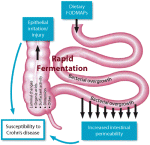Personal view: food for thought – western lifestyle and susceptibility to Crohn's disease. The FODMAP hypothesis, Gibson in Alimentary Pharmacology and Therapeutics (2005)
"A new hypothesis is proposed, by which excessive delivery of highly fermentable but poorly absorbed short-chain carbohydrates and polyols (designated FODMAPs – Fermentable Oligo-, Di- and Mono-saccharides And Polyols) to the distal small intestinal and colonic lumen is a dietary factor underlying susceptibility to Crohn's disease. The subsequent rapid fermentation of FODMAPs in the distal small and proximal large intestine induces conditions in the bowel that lead to increased intestinal permeability, a predisposing factor to the development of Crohn's disease. Evidence supporting this hypothesis includes the increasing intake of FODMAPs in western societies, the association of increased intake of sugars in the development of Crohn's disease, and the previously documented effects of the ingestion of excessive FODMAPs on the bowel. This hypothesis provides potential for the design of preventive strategies and raises concern about current enthusiasm for putative health-promoting effects of FODMAPs."
"FODMAPs might be considered the ‘fast food’ for bacteria."
"
Review article: fructose malabsorption and the bigger picture" in
Alimentary Pharmacology & Therapeutics (2007)
" A preliminary report has indicated that application of the FODMAP approach and dietary intervention in patients with Crohn's disease has had symptomatic benefit in a high proportion.
91 Likewise, reducing FODMAP intake may lead to improved pouch function in patients with an ileo-anal pouch anastomosis. ... FODMAPs have been recently hypothesized to play a role in the pathogenesis of Crohn's disease and have been speculatively linked to the increased prevalence of Crohn's disease in Western countries.
21 While evidence to support such a contention is limited, it does warrant serious consideration because such factor is amenable to preventive measures. ... The concept of fructose malabsorption has been generally poorly understood in the gastroenterological community, perhaps to a large extent due to its being considered an illness or abnormality, and due to the lack of awareness of dietary fructans in the genesis of symptoms."




